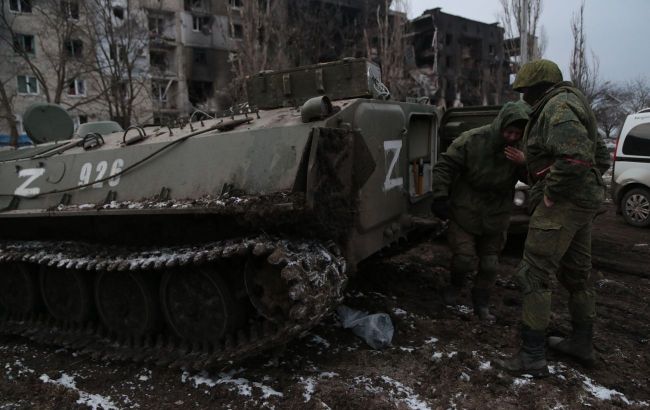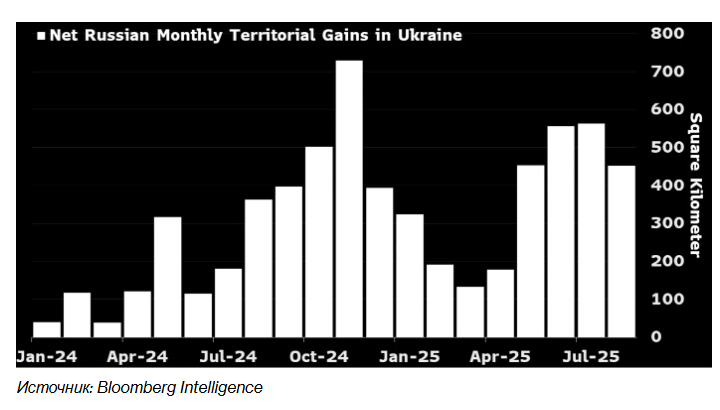Russia preparing new offensive against Ukraine — Bloomberg
 Photo: Russia prepares for an autumn offensive in Ukraine after the failure of its summer offensive (Getty Images)
Photo: Russia prepares for an autumn offensive in Ukraine after the failure of its summer offensive (Getty Images)
European leaders are expressing growing concern that Russia is preparing a new offensive against Ukraine. They discussed this during a meeting with President Volodymyr Zelenskyy, who reportedly addressed security guarantees, according to Bloomberg.
At a security council meeting in Toulon last week, German and French officials discussed the build-up of Russian troops near Pokrovsk in the Donetsk region. According to sources, Russia has deployed large forces in the area.
Situation near Pokrovsk
Zelenskyy said on Friday that Russia had concentrated about 100,000 soldiers on the front line near the city. The Kremlin has been trying to surround and capture Pokrovsk for over a year, but without success.
Capturing this city would open the way for Russia to attack Kramatorsk and Sloviansk. Moscow seeks to take control of the entire Donetsk region.
Meeting in Paris and US role
A meeting of the Coalition of the Willing will be held in Paris, where it is planned to finalize discussions on security guarantees for Ukraine after the war. The leaders also intend to talk to Donald Trump.
The Europeans hope to clarify the US's commitments and get Washington to tighten sanctions against Russia. France wants to show that Europe has done its part, and now it is the US president's turn.
Position of European leaders
French President Emmanuel Macron said in Paris, together with Zelenskyy, that Europe is ready to provide security guarantees to Kyiv. The Prime Ministers of the Netherlands and Poland are also expected to attend the meeting, while the leaders of the UK, Italy, and Germany will join via video link.
Despite Trump's attempts to push for an end to the war, including his meeting with Putin in Alaska, Moscow shows no sign of being ready for a truce. Although the US President has threatened sanctions, he has not yet imposed them.
Disagreements in Europe
Europeans are discussing possible security guarantees for Ukraine, including the option of sending soldiers after the end of hostilities. This issue remains controversial among allies and is categorically rejected by Russia.
Trump ruled out the possibility of sending American troops, but allowed for the provision of air and intelligence support. US Ambassador to NATO Matthew Whitaker noted that Ukraine must agree to the security architecture, but Russia must also be comfortable with it.
NATO and negotiation process
NATO Secretary General Mark Rutte said that after the completion of European consultations, it will be possible to interact more actively with the US. He stressed that clarity on guarantees is extremely important before any meetings between Putin and Zelenskyy.
However, diplomatic efforts are stalling. Sources note that after a surge of activity in early August, negotiations have stalled, while Russia is preparing for new attacks.
Course of war and losses
Russia's grueling summer offensive has not yet brought the Kremlin significant territorial gains. Moscow's troops advanced slowly, capturing 2,033 square kilometers between May and August, which is 0.3% of Ukraine's total area.

At the same time, Russia intensified its air strikes. According to the UN, July was the deadliest month for Ukrainian civilians since May 2022: 589 people were killed and 1,152 were injured. At least 25 people were killed in a strike on Kyiv on August 28.
Support for Ukrainian army
Amid the ongoing war, Zelenskyy and his allies are working to strengthen Ukraine's armed forces. Chancellor Friedrich Merz said that this is the most important security guarantee they can give.
He noted that the issue of deploying foreign troops can only be discussed after a ceasefire. Merz stressed that the strengthening of Ukraine's army must continue in parallel with any negotiations with Russia.
The German chancellor said Ukraine must be able to defend itself in the long term, and we want to help it do so, both now and in the future.
Merz also said that it is necessary to ensure that Russia can no longer sustain its military economy. "In this context, I'm talking about economic exhaustion, which we must help bring about," Merz said.
Merz called Putin a war criminal. "He is possibly the most serious war criminal of our time, which we are now witnessing on a large scale," Merz said.
According to Merz, Putin sees no reason to reach a ceasefire or peace agreement with Ukraine. "I have no reason to believe Putin on any point," he added.

